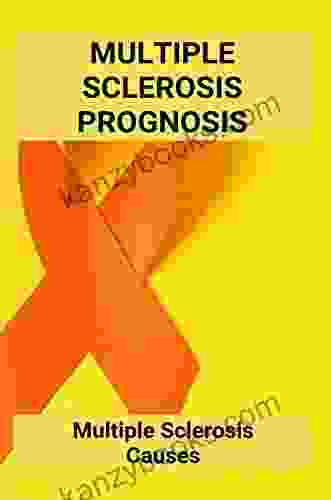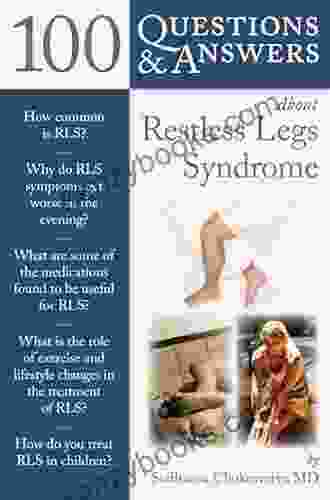100 Questions & Answers About Restless Legs Syndrome: Unraveling the Enigmatic Condition

Restless Legs Syndrome (RLS) is a common neurological condition characterized by an irresistible urge to move the legs, usually accompanied by uncomfortable sensations. While it doesn't pose immediate physical harm, RLS can significantly impair sleep, quality of life, and daily activities. In this extensive guide, we present 100 thought-provoking questions and answers that aim to demystify this complex condition.
4.6 out of 5
| Language | : | English |
| File size | : | 1565 KB |
| Text-to-Speech | : | Enabled |
| Screen Reader | : | Supported |
| Enhanced typesetting | : | Enabled |
| Print length | : | 180 pages |
Section 1: Understanding RLS
What is Restless Legs Syndrome?
RLS is a neurological disFree Download characterized by an unpleasant sensation in the legs, causing an irresistible urge to move them.
What are the core symptoms of RLS?
The hallmark symptoms include an aching, tingling, or creeping sensation in the legs that worsens in the evening or at night.
Section 2: Causes and Risk Factors
What causes RLS?
The exact cause is unknown, but genetics, iron deficiency, pregnancy, and certain medical conditions play a role.
What are the risk factors associated with RLS?
Factors like family history, age, pregnancy, and certain medications can increase the risk of developing RLS.
Section 3: Diagnosis and Evaluation
How is RLS diagnosed?
Diagnosis typically involves a thorough medical history and physical examination, considering the characteristic symptoms and ruling out other conditions.
What are the typical diagnostic criteria for RLS?
The International Restless Legs Syndrome Study Group (IRLSSG) established diagnostic criteria based on the presence of specific symptoms and exclusion of other causes.
Section 4: Treatment Options
What are the treatment options for RLS?
Treatment strategies vary depending on individual circumstances and may include lifestyle modifications, medications, or surgical interventions.
What lifestyle modifications can help manage RLS?
Regular exercise, maintaining a healthy weight, avoiding caffeine and alcohol before bed, and establishing a regular sleep-wake cycle can provide relief.
What medications are used to treat RLS?
Various medications, such as dopaminergic agents, alpha-2-delta ligands, and opioids, can alleviate symptoms in moderate to severe cases.
When is surgery considered for RLS treatment?
In rare cases, surgical procedures like deep brain stimulation or spinal cord stimulation may be recommended.
Section 5: Impact and Management
How does RLS affect daily life?
RLS can significantly impact sleep quality, social interactions, work performance, and overall well-being.
What are the psychological implications of RLS?
Chronic RLS can lead to anxiety, depression, and reduced self-esteem due to the constant discomfort and sleep disturbances.
How can individuals manage the emotional burden of RLS?
Support groups, cognitive behavioral therapy, and stress management techniques can help cope with the emotional challenges.
Section 6: Research and Future Directions
What is the current state of RLS research?
Ongoing research aims to uncover the underlying mechanisms, explore new treatment options, and improve understanding of disease progression.
What are promising areas of investigation in RLS research?
Researchers are exploring genetic factors, environmental triggers, and advanced treatment strategies, including gene therapy and neuroimaging techniques.
Restless Legs Syndrome is a complex and multifaceted condition that affects millions worldwide. This comprehensive guide provides a deep dive into RLS, exploring its causes, symptoms, treatments, and impact on individuals' lives. By understanding the complexities of RLS, we can empower patients to manage their symptoms effectively, improve their quality of life, and contribute to ongoing research efforts.
4.6 out of 5
| Language | : | English |
| File size | : | 1565 KB |
| Text-to-Speech | : | Enabled |
| Screen Reader | : | Supported |
| Enhanced typesetting | : | Enabled |
| Print length | : | 180 pages |
Do you want to contribute by writing guest posts on this blog?
Please contact us and send us a resume of previous articles that you have written.
 Book
Book Novel
Novel Page
Page Chapter
Chapter Text
Text Story
Story Genre
Genre Reader
Reader Library
Library Paperback
Paperback E-book
E-book Magazine
Magazine Newspaper
Newspaper Paragraph
Paragraph Sentence
Sentence Bookmark
Bookmark Shelf
Shelf Glossary
Glossary Bibliography
Bibliography Foreword
Foreword Preface
Preface Synopsis
Synopsis Annotation
Annotation Footnote
Footnote Manuscript
Manuscript Scroll
Scroll Codex
Codex Tome
Tome Bestseller
Bestseller Classics
Classics Library card
Library card Narrative
Narrative Biography
Biography Autobiography
Autobiography Memoir
Memoir Reference
Reference Encyclopedia
Encyclopedia Sydney Ross Singer
Sydney Ross Singer Xandra Nash
Xandra Nash Tara Grant
Tara Grant Sujin Chen
Sujin Chen Heston Brown
Heston Brown Sarah Clark
Sarah Clark Tzvi Freeman
Tzvi Freeman Walt Larimore
Walt Larimore Sylvia Correnaro
Sylvia Correnaro Simon Schnieders
Simon Schnieders Sarah Bartlett
Sarah Bartlett Jenni Hunt
Jenni Hunt Wayne W Dyer
Wayne W Dyer Thomas Moran
Thomas Moran Kristin Mcgee
Kristin Mcgee Sssst Publications Division
Sssst Publications Division Stephanie L Tourles
Stephanie L Tourles Tulku Thondup
Tulku Thondup Susan Verde
Susan Verde Ravinder Singh
Ravinder Singh
Light bulbAdvertise smarter! Our strategic ad space ensures maximum exposure. Reserve your spot today!

 Ismael HayesFrom the Applied Geometry of Albrecht Dürer Illustrated: A Journey into the...
Ismael HayesFrom the Applied Geometry of Albrecht Dürer Illustrated: A Journey into the...
 Raymond ParkerEmbark on a Spiritual Odyssey with "The Complete Works of Swami Vivekananda...
Raymond ParkerEmbark on a Spiritual Odyssey with "The Complete Works of Swami Vivekananda... Andrew BellFollow ·5.3k
Andrew BellFollow ·5.3k Branden SimmonsFollow ·2.8k
Branden SimmonsFollow ·2.8k Dale MitchellFollow ·15.7k
Dale MitchellFollow ·15.7k Owen SimmonsFollow ·4.9k
Owen SimmonsFollow ·4.9k Joel MitchellFollow ·2.3k
Joel MitchellFollow ·2.3k Truman CapoteFollow ·7.4k
Truman CapoteFollow ·7.4k George OrwellFollow ·6.3k
George OrwellFollow ·6.3k Reginald CoxFollow ·3.8k
Reginald CoxFollow ·3.8k

 Virginia Woolf
Virginia WoolfGetting High Fat Diet Easily Using Keto Fat Bomb Cookbook
Unveiling the Power of Fat...

 Milan Kundera
Milan KunderaAre You Cryin' Brian? Find the Inspiration and Humor in...
Life can be full of...

 Edmund Hayes
Edmund HayesUnlock Your Vitality: The 15-Day Natural Energy Boost...
Are You Ready to...

 Gavin Mitchell
Gavin MitchellMultiple Sclerosis Life Expectancy: Unveiling the Impact...
Multiple Sclerosis (MS) is a...

 Gabriel Garcia Marquez
Gabriel Garcia MarquezGet The Thighs That Can Crack Man Head Like Walnut
Are you tired of weak, flabby...
4.6 out of 5
| Language | : | English |
| File size | : | 1565 KB |
| Text-to-Speech | : | Enabled |
| Screen Reader | : | Supported |
| Enhanced typesetting | : | Enabled |
| Print length | : | 180 pages |









